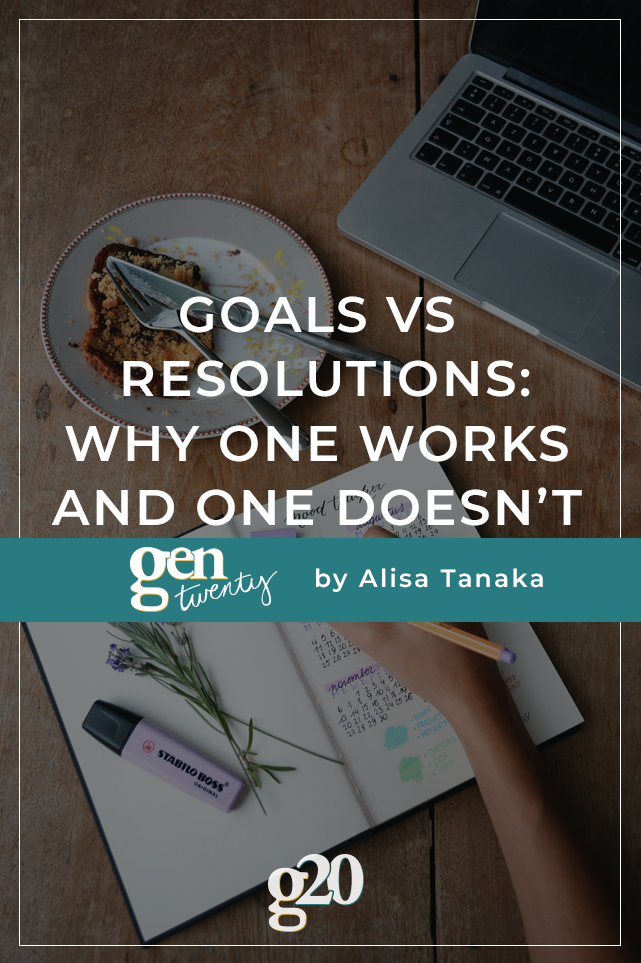
Like many people in the new year, I used to set New Year’s resolutions. Get fit (by working out four to five times a week), meditate every day (when up until this year, I could barely sit still for two minutes), build my confidence (when I have dealt with low self-esteem for the majority of my life so far).
Sound familiar?
Research shows that out of the 42% of Americans who usually make resolutions, only 9.2% of Americans feel that they are successful in achieving their resolutions. Every time I made a resolution, I found myself firmly in the “did not achieve” camp by December 31st.
I tend to overestimate what I can do without considering my past behavior, habits, or patterns. In the case of New Year’s resolutions, this leads to setting unrealistic goals. I would tell myself on January 1st that I would work out 4 to 5 days a week. I planned to get a six-pack of abs by the time December 31st rolled around.
Subsequently I would go full out and keep that resolution for about 3 weeks (or longer if I was lucky) before burning out. Then I’d abandon my fitness plan completely. I would also beat myself up internally for not keeping my promise to myself and choosing to be a couch potato rather than going to the gym to pump iron. Come New Year’s Eve, you guessed it, no six pack of abs.
Another reason that I no longer make resolutions is because I am what Gretchen Rubin calls an “obliger.” An “obliger” needs accountability in order to do things. If someone tells or asks me to do something, I will most likely do it. However, even if I gave myself all the tools necessary to succeed, I would consistently fall off the bandwagon if I didn’t have anyone holding me accountable.
Rather than setting big, sweeping, unrealistic New Year’s resolutions that keep me feeling down about myself, I like to break my larger goals into smaller, more attainable goals.
I tried this when I initially made the switch to a plant-based diet, and I found that it worked well for me. Here’s why:
It Allows Me To Have Wiggle Room
Allowing myself the gift of flexibility when it comes to my goals lets me listen to my instincts. I never thought that I would be saying this, especially as a self-professed lover of structure, but I have found that too much structure can suffocate me sometimes.
Over the years, I have found that I don’t often follow through on the promises I make to myself unless there is someone holding me accountable. It can be especially difficult to motivate myself some days.
Before I left for Taiwan, a trusted family member suggested that I meditate every day, even if only for 5 minutes. Meditating, they said, would allow me to have some quiet time to myself before my busy workdays. For some reason, even though I had tried meditating before, this time, it clicked, and I began meditating to find a sense of familiarity and silence amid the chaos of my move.
I like the structure of a morning routine. And I liked that I was meditating every work day. However, I knew that I preferred sleeping in on my days off. Rather than saying to myself, “You said you were going to meditate EVERY DAY and EVERY WORK DAY is not every day,” and admonishing myself for falling off the New Year’s resolution wagon, I simply said to myself, “You can meditate every workday.” This is something that I’ve been doing fairly consistently for the last 6 months.
Giving myself flexibility within my own goals rather than adhering strictly to a New Year’s resolution takes the pressure off me and allows me the flexibility to enjoy the time off that I’m given. By the same token, I can also choose to meditate on a day off should I need to.
[click_to_tweet tweet=”Goals vs Resolutions: Why One Works and One Doesn’t” quote=”Goals vs Resolutions: Why One Works and One Doesn’t”]
Make These Goals For You (And Customize Them As Such)
Making these goals attainable is important as well. If you’ve never sat still for 15 minutes in your life or meditated, you can’t expect to suddenly be able to meditate for 15 minutes. Making little, attainable goals like meditating in the morning for 5 minutes a day is much more realistic.
When you feel ready, you can always add another facet to your existing goals. As a loved one said to me as they taught me how to cook, “You can always add more, but you can’t take things away.”
Knowing what your habits and tendencies are can also help you customize your goals. The same way I was able to change my goal from “meditating every day” to “meditating every work day.”
Another reason I don’t like to make resolutions anymore is because goals change, just like careers do. Who knows if we will have the same resolutions in June that we have in January?
For me, the word “resolution” feels like an irrevocable thing. Even though, as a twenty-something, I understand perfectly well that resolutions are changeable. Personally, I think that the word “goals” suggests that they can be changed if needed in order to accommodate how someone changes over the course of a year. However, that is just my personal opinion.
If the word “resolution” sits well with you, than by all means, continue to make New Year’s resolutions. If the word “goals” resonates with you, feel free to do what you see fit. Regardless of what you decide to call them and why, setting goals is never a bad thing.
